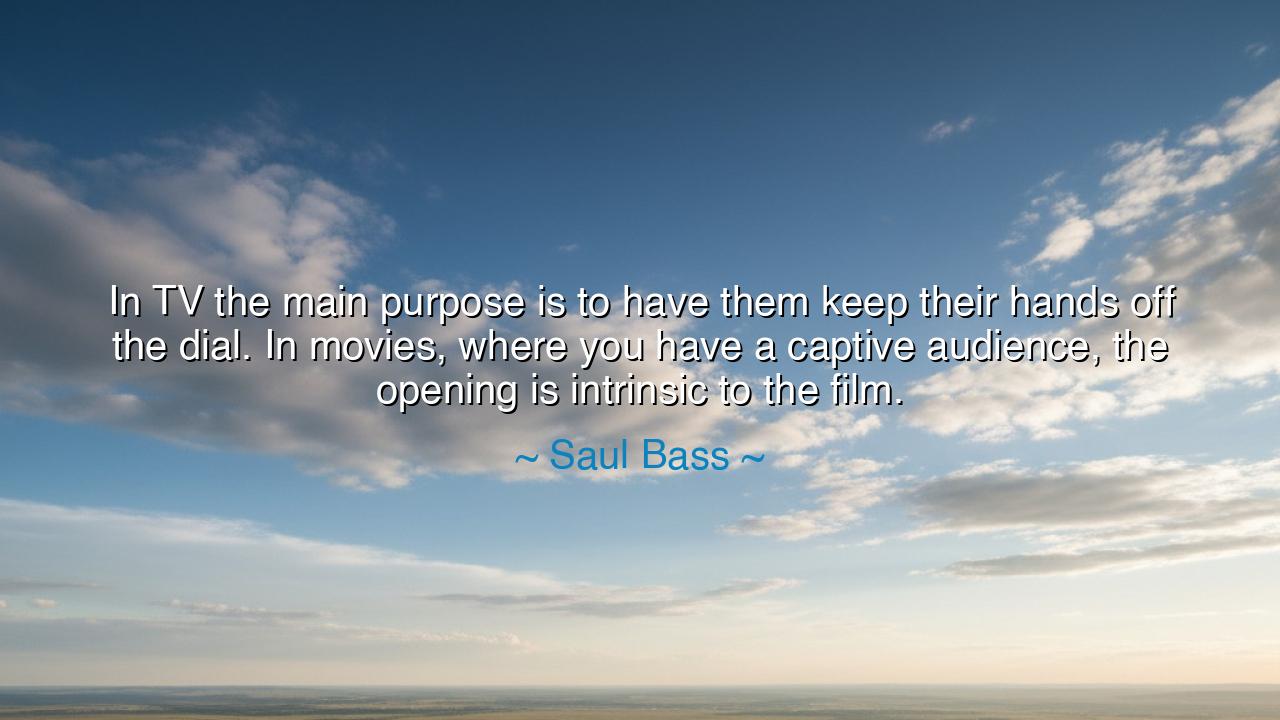
In TV the main purpose is to have them keep their hands off the
In TV the main purpose is to have them keep their hands off the dial. In movies, where you have a captive audience, the opening is intrinsic to the film.






When Saul Bass declared, “In TV the main purpose is to have them keep their hands off the dial. In movies, where you have a captive audience, the opening is intrinsic to the film,” he was not simply speaking of entertainment, but of the very nature of attention, of how stories enter the human soul. He, the master of title design, understood that beginnings are not ornaments but gateways. In television, the fight is for survival against distraction—the restless hand reaching for the dial, the wandering eye ready to depart. But in cinema, once the audience is seated and the lights have fallen, the opening becomes the foundation upon which the entire house of story is built.
The opening is the heartbeat of narrative. In television, it must seize at once, bright and urgent, so that the viewer does not turn away. But in film, the opening is not merely bait—it is intrinsic, a part of the body of the story itself. Bass, who crafted iconic sequences for films like Vertigo and Psycho, knew that the first moments are not to be wasted. They set the rhythm, the tone, the very breath of the work. To neglect the opening is to enter a temple with broken gates, leaving the worshipper unprepared for what lies within.
This truth recalls the wisdom of the ancients. Consider the epic of Homer, whose Iliad begins not with wandering but with a thunderclap: “Sing, O Muse, the anger of Achilles.” In that opening cry, the heart of the tale is revealed—anger, glory, mortality. The listener is drawn in, not by distraction but by gravity. The opening is not decoration but essence. So too did Bass proclaim: in cinema, the beginning is not separate from the film, but its living root.
In the realm of television, however, Bass acknowledged the harder truth: distraction reigns. The storyteller must fight to keep the audience from fleeing. Here, craft must be sharp, immediate, irresistible, like the cry of a herald in a crowded marketplace. The purpose is to hold the eye, to keep the hand from the dial. In this way, the artist battles not only rival stories, but apathy itself.
The lesson, O seekers, extends beyond screen and story. In all endeavors, the beginning matters. The way you enter into labor, into speech, into love, shapes the course of what follows. A weak beginning leaves the listener restless; a strong one commands their spirit. Whether you are writing a letter, opening a meeting, or greeting a friend, remember that your first words are not trivial—they are the doors through which hearts will walk.
Practical action lies before you: when you create, labor most carefully over your opening. Ask yourself: does it seize, does it prepare, does it reveal the essence of what is to come? If you teach, let your first sentence awaken curiosity. If you lead, let your first act command respect. If you love, let your first gesture show sincerity. For beginnings, once squandered, cannot easily be reclaimed.
Therefore, let Bass’s words ring as both craft and wisdom: in television, fight against distraction; in film, build the very soul of the story in the opening. And in life, do not underestimate your first moments. For those who master beginnings master the attention of others—and with that attention, they may carry their audience, their companions, their fellow travelers, through the whole journey that follows.






AAdministratorAdministrator
Welcome, honored guests. Please leave a comment, we will respond soon